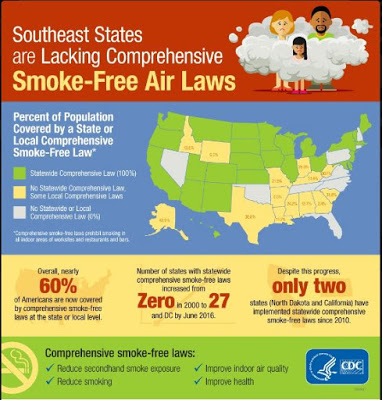Ky. and Southeast lack statewide smoking bans; political climate here has shifted focus to local bans; Hazard just passed one

Kentucky Health News
Kentucky hasn’t passed a comprehensive smoke-free law, but neither has any state in the Southeast, notes a recent Centers for Disease Control and Prevention report.
The CDC report says 28 states have comprehensive smoke-free laws, which are laws that prohibit smoking in all indoor areas of workplaces, restaurants and bars. These bans cover about 60 percent of Americans.
 California was recently added to the list, but overall adoption of statewide smoking bans has slowed recently. All but two of the 28 states, including the District of Columbia, enacted their comprehensive smoke-free laws between 2000 and 2010, and only two states passed such laws between 2010 and 2016. (Seven states have laws that include electronic cigarettes.)
California was recently added to the list, but overall adoption of statewide smoking bans has slowed recently. All but two of the 28 states, including the District of Columbia, enacted their comprehensive smoke-free laws between 2000 and 2010, and only two states passed such laws between 2010 and 2016. (Seven states have laws that include electronic cigarettes.)
“We’ve made great progress in protecting many Americans from secondhand smoke exposure,” CDC Director Tom Frieden told HealthDay. “But millions of Americans, especially those living in southeastern states, are still unprotected from this completely preventable health hazard.”
The report marks the 10-year anniversary of the 2006 Surgeon General’s report, The Health Consequences of Involuntary Exposure to Tobacco Smoke, that says there is no such thing as risk-free secondhand smoke and the only way to protect against it is by completely eliminating indoor smoking.
Exposure to second-hand smoke can cause stroke, lung cancer and heart disease in adults. Exposed children are at an increased risk for sudden infant death syndrome, acute respiratory infections, ear infections, asthma and slowed lung growth.
“Secondhand smoke exposure contributes to approximately 41,000 deaths among nonsmoking adults and 400 deaths in infants each year,” says the report.
The most recent Kentucky Health Issues Poll found that 66 percent of Kentucky adults favor a statewide smoking ban and 31 percent opposed it. However, efforts for a ban have stalled because new Republican Gov. Matt Bevin opposes such legislation, saying ity should be a local decision.
About one-third of Kentucky’s population is covered by comprehensive smoke-free policies, and another 10 percent or so live in places that have ordinances with varying exceptions. Kentucky has one of the nation’s highest smoking rates, 26 percent.
Ellen Hahn, a University of Kentucky nursing professor and director of the smoke-free policy center, encouraged advocates at a recent smoke-free conference to shift their efforts to localities because of the current political climate.
Hazard just approved an indoor workplace smoking ban that goes into effect July 6, WYMT-TV reports. In Eastern Kentucky, smoking and lung cancer rates are double the national average, PBS NewsHour reports.
Of the 23 states without comprehensive smoke-free laws, 14 of them have some local comprehensive smoke-free laws and nine of them don’t have any such laws at either the local or state level. Eight of those nine states without smoking bans have statutes that prohibit local bans, says the report. One, North Carolina, bans smoking in bars and restaurants.
“Smoke-free laws provide a low-cost, high-impact benefit to the public’s health,” Corinne Graffunder, director of the CDC’s Office on Smoking and Health, told HealthDay. “These laws substantially improve indoor air quality, help smokers quit, prevent youth and young adults from starting to smoke, change social norms about the acceptability of smoking, and reduce heart attack and asthma hospitalizations among non-smokers.”
